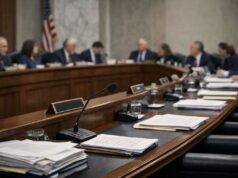Kazakhstan has escalated its efforts against unregulated cryptocurrency activities, blocking over 3,500 unauthorized online exchanges and freezing millions in digital assets. Spearheaded by the Financial Monitoring Agency (FMA) in collaboration with other governmental bodies, this sweeping operation reflects the country’s determination to combat money laundering and illicit transactions. As Kazakhstan tightens its regulatory grip on the rapidly evolving crypto sector, these measures reveal both, the opportunities and the challenges for stakeholders navigating this complex landscape.
A Sweeping Crackdown on Illegal Crypto Activities
In an unprecedented crackdown, the FMA partnered with the National Security Committee and the Ministry of Culture and Information to disrupt thousands of unlicensed cryptocurrency exchanges. The operation also targeted 36 offline exchanges, collectively handling over $112 million in turnover. Authorities froze approximately $4.8 million in digital assets, further emphasizing the operation’s scope and effectiveness.
Beyond shutting down exchanges, the campaign dismantled two significant cryptocurrency-based pyramid schemes that defrauded numerous investors. Authorities recovered 545,000 USDT and froze an additional 120,000 USDT. These efforts underscore the growing misuse of cryptocurrency platforms for fraud and money laundering, highlighting the urgent need for enhanced regulatory measures.
Regulatory Efforts and Their Implications
Kazakhstan’s actions align with a broader initiative to synchronize its cryptocurrency ecosystem with international anti-money laundering (AML) standards. According to the FMA, unregulated platforms often lack robust Know Your Customer (KYC) protocols and fail to monitor suspicious transactions, making them attractive to cybercriminals and drug traffickers. To address these vulnerabilities, the FMA is working with global partners to strengthen regulatory frameworks and promote accountability.
Currently, cryptocurrency exchanges in Kazakhstan are confined to operating within the Astana International Financial Centre (AIFC), a special economic zone designed to provide a regulated environment for digital asset services. The country’s 21 licensed service providers include major platforms such as Binance and Bybit. However, the National Bank of Kazakhstan has signaled plans to broaden cryptocurrency access beyond the AIFC’s jurisdiction, drawing inspiration from regulatory strategies adopted by neighboring nations.
Positive Outcomes: A Safer Crypto Landscape
The crackdown has been widely lauded for its potential to create a safer and more transparent cryptocurrency market in Kazakhstan. By targeting illicit platforms, the government aims to protect investors, deter fraudulent schemes, and reinforce compliance with AML laws. These efforts enhance Kazakhstan’s credibility as a serious player in the global crypto economy, strengthening trust among international stakeholders and positioning the country as a key player in the digital asset ecosystem.
Challenges: Balancing Oversight and Innovation
While these measures address critical security concerns, they also raise questions about their impact on innovation and legitimate cryptocurrency activities. Critics argue that overly restrictive policies and excessive reliance on the AIFC as the sole regulated hub may stifle broader adoption and deter entrepreneurs and investors from entering Kazakhstan’s crypto market. Finding the right balance between rigorous oversight and fostering a thriving innovation ecosystem remains a pressing challenge.
Balancing Regulation and Growth
Kazakhstan’s path forward requires a strategic balance between enforcing regulatory compliance and encouraging growth in the crypto sector. While combating illicit activities is essential, the government must also prioritize policies that support the development of legitimate businesses. Expanding regulated opportunities beyond the AIFC and addressing bottlenecks in accessibility will be critical in positioning Kazakhstan as a global leader in the cryptocurrency space.
>>> Read more: Kyrgyzstan Paving the Way for a Central Asian CBDC Revolution
Kazakhstan’s aggressive crackdown on illegal cryptocurrency activities marks a significant milestone in its regulatory evolution. The government has taken decisive steps to protect investors and curb financial crimes by prioritizing security and compliance. However, the long-term success of these efforts will hinge on maintaining a balance between strict enforcement and fostering innovation.
As the global crypto landscape continues to evolve, Kazakhstan’s actions serve as a valuable case study in the complexities of regulating this dynamic industry. By addressing challenges strategically and nurturing a supportive environment for legitimate businesses, Kazakhstan has the potential to emerge as a model for effective crypto regulation, blending robust oversight with sustainable growth and innovation.
Readers’ frequently asked questions
What is money laundering, and why is it a concern in the cryptocurrency industry?
Money laundering is the process of disguising the origins of illegally obtained funds to make them appear legitimate. In the cryptocurrency industry, this is a major concern. Digital assets can be transferred across borders quickly and often without sufficient oversight. That makes it easier for criminals to hide illicit gains. Unregulated exchanges are particularly vulnerable to this because they may not enforce identity checks or monitor suspicious transactions. Therefore Kazakhstan focuses on shutting down illegal exchanges that fail to comply with anti-money laundering (AML) regulations.
What is the significance of KYC protocols in cryptocurrency exchanges?
Know Your Customer (KYC) protocols require cryptocurrency exchanges to verify the identity of their users. Typically, they would collect official identification documents. These protocols are essential because they help exchanges identify potential risks, such as fraudulent activity or money laundering. They ensure compliance with regulatory standards. In Kazakhstan, the lack of KYC measures on illegal exchanges was a major factor in the government’s crackdown. Cybercriminals often exploited these platforms. For users, engaging with exchanges that implement KYC ensures a safer trading environment. It reduces the risk of participating in illicit activities unknowingly.
How can someone tell if a cryptocurrency exchange is operating legally in Kazakhstan?
In Kazakhstan, legitimate cryptocurrency exchanges must operate within the Astana International Financial Centre (AIFC), a regulated environment for digital asset services. These exchanges must hold licenses issued by the relevant authorities. Examples of licensed platforms include Binance and Bybit. To verify an exchange’s legitimacy, users can check its licensing status through the AIFC’s official directory. They can also consult the Financial Monitoring Agency (FMA) for updates on compliant service providers.
What Is In It For You? Action Items You Might Want to Consider
Verify the Licensing Status of Your Exchange
Before trading or investing in cryptocurrencies, ensure the platform you use is licensed and operates within a regulated framework. In Kazakhstan, exchanges must be registered under the Astana International Financial Centre (AIFC). Check the exchange’s credentials and confirm its licensing status to safeguard your assets and avoid potential legal or financial issues.
Avoid Platforms Without Strong KYC Measures
When choosing a cryptocurrency exchange, prioritize those that enforce strict Know Your Customer (KYC) protocols. Platforms that require identity verification are less likely to be involved in fraudulent activities or targeted by cybercriminals. Avoiding exchanges that skip KYC processes can protect your funds and keep you on the right side of regulations.
Stay Updated on Regulatory Changes
Regulations in the crypto industry evolve rapidly, and staying informed can help you make smarter trading decisions. Monitor announcements from Kazakhstan’s Financial Monitoring Agency (FMA) or similar bodies in your region to understand new rules, expanded opportunities, or restrictions. Being proactive ensures you can adapt quickly to changes and avoid disruptions in your trading activities.











[…] >>> Read more: Kazakhstan Cryptocurrency Crackdown: 3,500 Exchanges Shut Down […]
[…] first enforcement wave reduced the visibility of openly unlicensed exchanges, but informal crypto activity adjusted quickly and continued through other […]